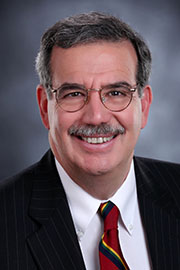
12/08/2020
After much discussion with his cabinet and others, President Erik J. Bitterbaum recently reconstituted the membership of the existing President’s Council, which advises campus leadership on critical campus issues.
Over the years SUNY Cortland increased the membership of the group several times in order to ensure that offices feel represented. An unfortunate side effect was that the body grew so large that meetings turned into reporting sessions with almost no opportunity for discussion, questions or making decisions.

More important, the President’s Cabinet recently received compelling feedback from individuals across campus that SUNY Cortland required more diverse voices at the highest levels of decision-making.
The university’s President’s Council now consists of the following members:
- President
- Provost and Vice President, Academic Affairs
- Vice President, Finance and Management
- Vice President, Institutional Advancement
- Vice President Student Affairs
- Assistant Vice President, Enrollment Management
- Associate Provost, Academic Affairs
- Associate Provost, Information Resources
- Associate Vice President, Facilities Management
- Associate Vice President, Human Resources
- Associate Vice President, Institutional Advancement
- Associate Vice President, Student Affairs
- Chief of Staff
- Chief Diversity and Inclusion Officer
- Dean, School of Arts and Sciences
- Dean, School of Education
- Dean, School of Professional Studies
- Director of Communications
Although this listing represents the formal composition of the new President’s Council, the group will regularly invite other members of the campus community to speak on specific topics and contribute to the meeting deliberations. Additionally, faculty and staff will have the opportunity to offer agenda items for council meetings.
“I realize that this decision represents a major change in the university’s leadership structure, but I believe it is the right thing to do for us moving forward,” Bitterbaum said. “In my view, this reconfiguration will create a concentrated deliberative body that brings multiple perspectives from across all campus constituencies.
“Further, this group will have the ability to influence and enact policies that reflect those constituencies as well as our institutional mission. Finally, it is my hope that this change will lead us toward informed decision-making that is inclusive and value-based.”